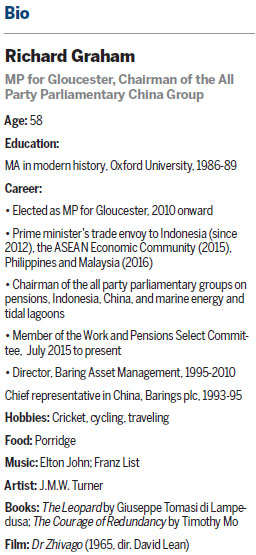'We are all Brexiters now'
Updated: 2016-08-12 07:57
By Angus McNeice in London(China Daily Europe)
|
|||||||||
British Parliament's leading expert on China says leaving the EU will make Sino-British relations more exciting
Despite the cloud of uncertainty that has hung over Britain since the June 23 referendum on whether to exit the European Union, one of the government's foremost China experts believes there is reason to be optimistic about the future of Sino-British ties.
Richard Graham, chairman of the All Party Parliamentary China Group, believes Britain will benefit from a more direct connection with China when it begins to act as a stand-alone nation.
|
Richard Graham says there is reason to be optimistic about the future of the Sino-British ties. Provided to China Daily |
"Brexit potentially makes the UK-China trading relationship much more exciting, because for 45 years we've effectively subcontracted trade negotiations to a third party. And that's never ideal because their interests aren't always yours," says the MP for Gloucester, in his office in Westminster.
"I voted for remain because I thought, on balance, the short-term risk outweighed any potential long-term gain. But I think what's really interesting is the speed at which we've all moved from being 'in or outers' to recognizing that we're all Brexiters now - we're going to leave the European Union and we're going to make the best of it."
Graham recommends that new Foreign Secretary Boris Johnson ("nobody better for the job") familiarize himself with what the Chinese want from Britain, especially as Britain faces a "potential loss of influence" around the discussion table when it comes to European points of view on Chinese trade access.

"For example, it's perfectly obvious to everyone that aviation in Asia is going to explode," he says. "China is going to need not just lots of new, well-designed airports, but also sophisticated air traffic management. Our National Air Traffic Service has huge experience and a lot of knowledge about how exactly that works and what sort of business would be appropriate.
"We've got lots to offer, and they've got lots to offer us. Expanding people-to-people contact will be enormous."
The people-to-people era is what Graham identifies as the last of three roughly decade-long phases that comprise his long relationship with China.
He first arrived on the Chinese mainland in 1980 - about two years into the nation's economic reform - on a business trip for conglomerate John Swire & Sons. It was a time when Sino-British relations were almost exclusively government to government.
"My overriding memory of that day and night in Guangzhou (a southern metropolis) in 1980 was the burning desire to buy a 'Mao jacket', to merge into the crowd. Every male and every female was wearing one. There was an overwhelming need to fit in and not stand out in the crowd by wearing what looked like rather garish Western clothes. There were so few foreigners in Guangzhou at the time.
"Now, everything is completely different. A 22-year-old English graduate arriving in Guangzhou today would be wearing very similar clothes to his contemporaries, would be seeing Western brands or Chinese brands broadly modeled on Western fashions available in every shop, at every coffee shop and hotel."
Graham was heavily involved in the transition from a state-to-state relationship to a business-to-business dialogue in the 1990s. He opened the first foreign investment banking office in China in 1993 in Shanghai for British merchant bank Barings, and he created the British Chamber of Commerce in the same city.
"At that stage, (foreign companies) were the major corporate taxpayers in the country - Chinese companies paid very little tax - so we were an important revenue base for the local government as well. These things symbolized what for me was the great mantra of the 1990s: Anything is difficult, but everything is possible. The key thing is that it was a fertile environment for Chinese and foreign entrepreneurs."
Graham, who has a son named Hu Sheng (meaning "born in Shanghai"), witnessed China transform more rapidly than he could have imagined, and in turn the country changed him.
"I've been influenced by a lot of Chinese people I've worked with, and it has probably changed me politically, too," he says. "I'm conscious of the reasons why China ultimately rejected nationalist government, the sense of decadence and corruption and not being in it for everyone and not serving the people effectively."
The call of public service drew him to what he describes as an unlikely career in politics, after long stints in the private sector and NGOs through his work with Care for Children, a joint-venture charity in China that has placed half a million children in foster homes.
"Gloucestershire, the county where I've always lived in the UK, has a city, Gloucester, that by 2009 was not in a very good state. It was a place where things needed to be done, and some of that dynamism and energy for regeneration that I'd seen in Hong Kong and China was the sort of spirit that I wanted to see helping Gloucester," he says of his decision to enter public service.
Graham was elected in 2010, transitioning from a professional career that focused primarily on shareholders' interests into the service of the people of Gloucester, to "reinvest social rather than financial capital".
"The bulk of what we do is pretty unsexy because it's helping constituents in distress: Can my child get into a school? Is my grandmother being looked after properly? If my father falls down the stairs, will the hospital look after him properly? Are the roads being maintained? Is it safe to walk in the park after dark? Are there drug dealers next door?
"These are the very earthy, granular, modern urban challenges that are out there all the time. Any MP who forgets to look after constituents in distress is completely lost. You need to have the patience and conscience of a good social worker."
When not attending his constituency, Graham's government work is heavily focused on Asia. He is the prime minister's trade envoy to the ASEAN Economic Community, the only parliamentarian who speaks fluent Mandarin and Cantonese, and is chairman of the All Party Parliamentary China Group.
"We have two very simple tasks," he says of the group. "The first is to be a platform for debate on all subjects of bilateral interest, which can range from animal rights to renminbi trading in London, and the second is to educate and inform parliamentarians about China, principally by raising enough funding from sponsors to be able to finance three trips a year to China."
On average, the group takes 25 MPs a year to China and offers parliamentarians the chance to learn about the country and meet Chinese officials, businesspeople and charity representatives. In conjunction with the China Britain Business Council, the group connects enterprises, with the goal of boosting activity in trade and services, activity that Graham imagines may well increase when Britain has the ultimate say over its bilateral policies.
"China can play such a constructive part in the future world if it wants to. And we'll always be a key part of Europe, even from the side, so they should have no concerns about that, or Britain's interest in doing more in Asia and more with China. This partnership will only get bigger and better."
angus@mail.chinadailyuk.com
( China Daily European Weekly 08/12/2016 page32)
Today's Top News
Ukraine denies attempted troop invasion of Crimea
Solidarity called to firefighters facing wildfires
Eurostar train staff to strike for seven days: UK union
Trump's gun rights comments ignite firestorm
China consumer prices up 1.8% in July
Video introduces G20 city Hangzhou to Europe
Leaders of Iran, Azerbaijan seek to boost trade
Storm in Macedonia kills at least 17
Hot Topics
Lunar probe , China growth forecasts, Emission rules get tougher, China seen through 'colored lens', International board,
Editor's Picks

|

|

|

|

|

|








